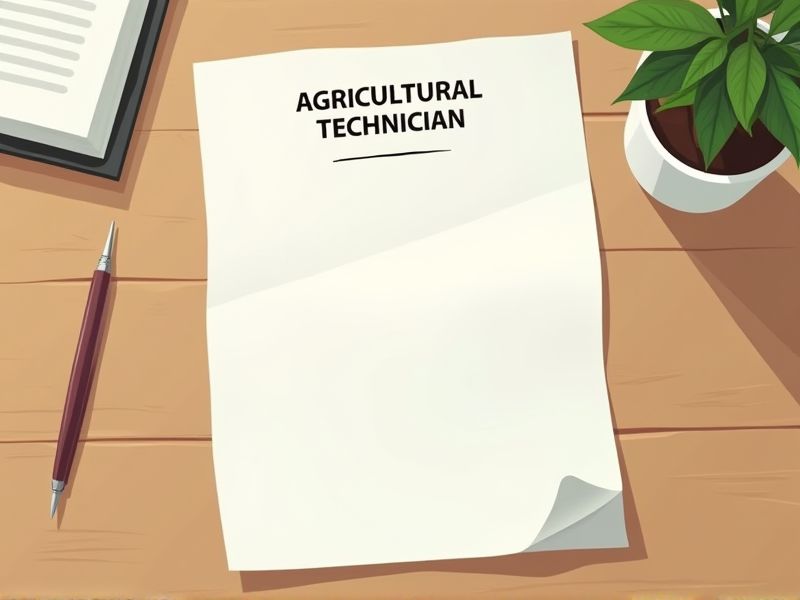
Agricultural Technicians perform crucial tasks involving sophisticated equipment and advanced agricultural techniques that require specialized skills. Without proper certifications, there's a risk of improper use of technology, potentially leading to reduced crop yields and compromised food safety. Certifications ensure technicians are knowledgeable about the latest trends and technologies in agriculture, enhancing productivity and sustainability. Here are some important certifications required for a career as an Agricultural Technician.
Certified Crop Adviser (CCA)
A Certified Crop Adviser (CCA) provides expert knowledge to optimize crop production by offering tailored recommendations based on soil and environmental conditions. Enhanced decision-making, guided by a CCA, can lead to improved crop yields and increased profitability for agricultural operations. Access to up-to-date research and resources via a CCA enables agricultural technicians to implement sustainable practices, reducing environmental impact. A CCA helps bridge the gap between scientific advancements and practical field application, promoting the use of innovative techniques in agriculture.
Pesticide Applicator License
A pesticide applicator license ensures agricultural technicians understand safe handling and application methods, reducing the risk of harm to both the environment and human health. Without proper licensing, technicians might misuse pesticides, leading to contamination of water sources and soil, which can affect ecosystems and public health. Licensing provides a structured framework for education, keeping technicians updated on the latest chemical regulations and integrated pest management practices. This requirement helps maintain public trust in agricultural products by ensuring that only qualified individuals apply potentially hazardous substances.
Integrated Pest Management (IPM) Certification
Integrated Pest Management (IPM) Certification equips agricultural technicians with knowledge on sustainable pest control, reducing reliance on chemical pesticides. Certification ensures that technicians can implement eco-friendly practices, thus minimizing environmental impact and promoting biodiversity. Expertise in IPM methods leads to healthier crop production by effectively managing pest populations without disrupting ecosystems. Obtaining IPM Certification provides credibility and assurance to stakeholders regarding the competent management of agricultural challenges.
Organic Certification (e.g., USDA Organic)
Organic certification establishes standards that agricultural technicians must follow to ensure produce is free from synthetic chemicals, fostering ecosystem balance. This certification builds trust with consumers seeking food safety and environmental sustainability, potentially increasing market access for producers. Adhering to certification requirements necessitates acquisition and application of specialized skills by agricultural technicians to enhance agricultural practices. The certification process enforces quality control, reducing the possibility of contamination and encouraging sustainable agriculture.
Nutrient Management Specialist Certification
Agricultural technicians must manage soil health and crop production; nutrient management specialist certification ensures they have the expertise to optimize fertilizer use and enhance crop yields. Certification provides technicians with comprehensive knowledge on sustainable practices, reducing environmental harm caused by nutrient runoff. With increasing regulatory frameworks, possessing certification enables technicians to comply with legal requirements and avoid penalties. The certification distinguishes technicians in the job market, potentially leading to better career opportunities and professional growth.
Agricultural Safety and Health Certification
Agricultural Safety and Health Certification equips agricultural technicians with knowledge to prevent accidents and injuries, enhancing workplace safety. This certification ensures compliance with industry regulations, reducing legal liabilities for employers. Training in safety procedures and proper equipment use leads to increased productivity and consistent crop quality. Employers often prefer certified technicians for their expertise in implementing safe agricultural practices.
Certified Irrigation Manager (CIM)
A Certified Irrigation Manager (CIM) enhances an Agricultural Technician's ability to optimize water use, directly influencing crop yield and resource efficiency. Proper irrigation management reduces water wastage, leading to cost savings and sustainable farm practices. CIMs provide technical expertise that helps technicians identify and address irrigation-related issues, preventing crop damage and enhancing plant health. Certification offers standardized training, ensuring that Agricultural Technicians possess up-to-date skills aligned with modern irrigation technologies.
Sustainable Agriculture Certification
Sustainable agriculture certification ensures agricultural technicians are equipped with practices that reduce environmental harm, promoting long-term farm viability. With certification, technicians gain credibility, which can lead to increased trust and collaboration with farmers and stakeholders. It provides a standardized framework that enhances productivity while conserving resources, aligning with global sustainability goals. Certification often opens doors to new markets that require proof of sustainable practices, expanding economic opportunities.
Agricultural Business Management Certificate
Agricultural Business Management certificates equip agricultural technicians with essential skills in financial planning and resource management, critical for optimizing farm operations. Understanding business principles helps technicians make informed decisions that can improve crop yields and sustainability. With increased knowledge of market trends, technicians can identify profitable opportunities and adapt strategies accordingly. Certificates provide formal recognition of expertise, enhancing career prospects and credibility within the agricultural sector.
Soil Health and Conservation Certification
Soil health directly influences crop productivity and ecosystem sustainability, making expertise in this area vital for agricultural technicians. Certification ensures technicians possess the latest knowledge in soil conservation techniques, which is crucial for maintaining long-term agricultural output. Enhanced skills in soil management can lead to reduced fertilizer use and better nutrient cycling, improving cost efficiency and environmental impact. Certified technicians can effectively guide farmers in adopting practices that improve soil resilience against climate change effects, ensuring food security and farm profitability.
Summary
When you earn certifications as an Agricultural Technician, you can expect enhanced job prospects due to heightened credibility. This validation of skills often leads to increased earning potential and career advancement opportunities. Employers may perceive you as more knowledgeable and reliable, thus fostering greater trust. The acquired certifications also allow you to implement the latest techniques, improving farm efficiency and sustainability.
